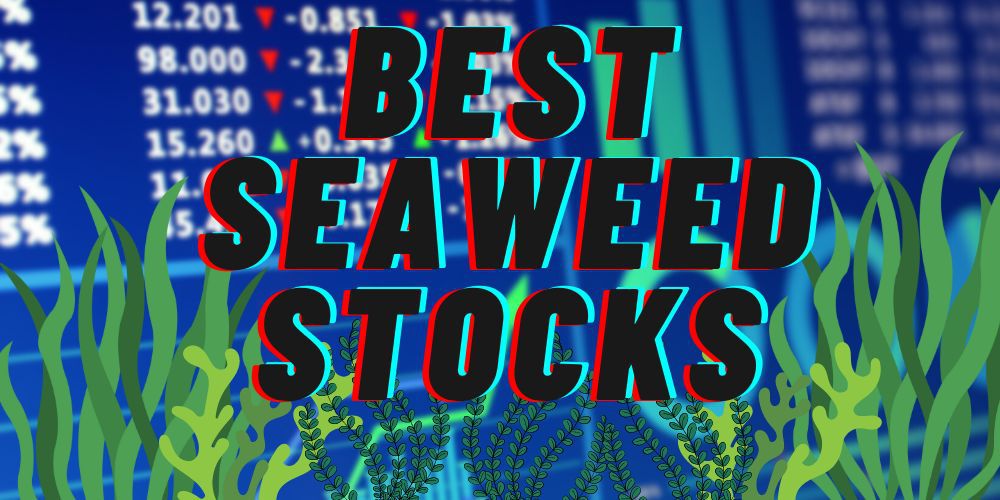Seaweed has quietly become one of the most promising sectors for sustainable investment in recent years.
The global seaweed market is expected to be worth $11.8 billion by 2030, with even more growth on the horizon.
In this article, we’ll explore why the best seaweed stocks are gaining traction, break down the key market drivers, and provide a comprehensive overview.
Whether you are new to this sector or looking to expand your portfolio, this guide will give you a clear understanding of the opportunity seaweed presents.
TL;DR: Best Seaweed Stocks Of 2025
- DuPont de Nemours, Inc. (DD) – Leader in sustainable bio-based materials, including seaweed.
- Kerry Group plc (KRYAY) – Global food ingredient supplier using seaweed extracts.
- Corbion N.V. (CSNVF) – Sustainable biochemical company specializing in seaweed derivatives.
- Ingredion Inc. (INGR) – Ingredient solutions provider expanding into seaweed additives.
- Oceana Group Limited (OCANF) – Aquaculture firm active in seaweed harvesting and processing.
- Crispr Therapeutics AG (CRSP) – Gene-editing pioneer enhancing seaweed cultivation potential.
6 Best Seaweed Stocks To Buy Now
DuPont de Nemours, Inc. (NYSE: DD)
Overview
DuPont de Nemours, Inc., commonly known as DuPont, is a global leader in the chemicals and biotechnology industry.
Headquartered in Wilmington, Delaware, the company has a broad portfolio that spans agriculture, nutrition, and bio-based materials.
Over the years, DuPont has increasingly invested in sustainable and bio-based innovations, with seaweed-derived products becoming a significant focus.
Seaweed’s unique properties enable DuPont to develop natural bio-stimulants, biodegradable materials, and food ingredients that align with global sustainability goals.
DuPont’s ability to leverage advanced research and large-scale production capabilities makes it a powerhouse in integrating seaweed into various commercial applications.
Growth Catalysts
Several factors contribute to DuPont’s potential growth in the seaweed sector.
First, the company’s strong R&D investments and partnerships with global food and agricultural corporations enable rapid development and deployment of seaweed-based solutions.
These solutions offer eco-friendly alternatives to synthetic chemicals in fertilizers, packaging, and food additives.
DuPont is also strategically positioned to benefit from regulatory trends favoring green technologies and sustainable agriculture.
Moreover, consumer demand for plant-based and natural products continues to rise, providing fertile ground for DuPont’s seaweed-derived innovations.
Its global supply chain and operational scale ensure it can meet increasing demand efficiently, potentially driving revenue growth in this niche.
Risks
Despite its strengths, DuPont faces risks typical of large diversified chemical companies venturing into new product categories.
The transition of seaweed innovations from lab to large-scale commercial viability involves regulatory hurdles and market acceptance challenges.
Additionally, fluctuations in commodity prices and supply chain disruptions can impact margins.
The competitive landscape is evolving rapidly, with many startups and established firms entering the seaweed space, which could affect DuPont’s market share.
Furthermore, broader economic downturns affecting the chemical industry may slow the pace of investments in sustainable product lines.
Conclusion
DuPont’s legacy as an innovation-driven chemical giant, combined with its commitment to sustainability, makes it a compelling player in the seaweed sector.
Its ongoing development of seaweed-based biostimulants and bio-based materials positions it well for growth as global demand for eco-friendly solutions expands.
While execution and market adoption risks remain, DuPont’s scale, R&D prowess, and strategic positioning provide a strong foundation for capitalizing on seaweed’s rising prominence.
Kerry Group PLC (OTC: KRYAY)
Overview
Kerry Group plc is a multinational food ingredients and flavors company headquartered in Ireland with a global presence.
It is renowned for its innovation in developing natural and sustainable ingredients for the food and beverage industry.

These include natural thickeners, fibers, and antioxidants, which meet growing consumer demand for plant-based and clean-label foods.
Kerry’s extensive research network and customer base allow it to integrate seaweed solutions efficiently into mainstream food production, making it a critical player bridging seaweed’s potential with large-scale food manufacturing.
Growth Catalysts
Kerry’s growth is driven by strong consumer trends favoring health-conscious, plant-based, and environmentally sustainable foods.
The company’s R&D investment supports innovation in seaweed-derived ingredients, positioning it to meet evolving market needs.
Strategic partnerships with seaweed cultivators and processors help secure supply chains and ensure product consistency.
Kerry’s global footprint enables rapid distribution to emerging markets where demand for seaweed-enhanced foods is rising.
Regulatory support for natural food additives and sustainable sourcing further bolsters growth prospects.
The company’s strong brand reputation and client relationships provide a stable platform for expanding seaweed applications in diverse food categories.
Risks
Kerry faces competition from both traditional ingredient suppliers and emerging specialty firms focused exclusively on seaweed.
Integration of seaweed ingredients must overcome challenges related to taste, texture, and cost competitiveness versus synthetic alternatives.
Market adoption may be slower in regions unfamiliar with seaweed products. Supply chain disruptions, particularly in harvesting and processing, could affect production and margins.
Broader risks include fluctuating raw material prices and regulatory shifts impacting ingredient approvals.
Conclusion
Kerry Group’s leadership in food ingredient innovation and its strategic embrace of seaweed position it well for long-term growth.
By addressing consumer demand for natural and sustainable products, Kerry offers investors exposure to a growing sector with solid fundamentals.
Continued investment in R&D and supply chain resilience will be key to maximizing seaweed’s potential within its portfolio.
Corbion N.V. (OTC: CSNVY)
Overview
Corbion N.V., headquartered in the Netherlands and traded over-the-counter in the U.S., is a global leader in sustainable biochemicals and bioplastics.
The company’s portfolio includes algae and seaweed-derived products used in food preservation, cosmetics, pharmaceuticals, and packaging materials.

Its innovations in converting seaweed biomass into high-value ingredients make it a frontrunner in the bio-based materials industry.
Growth Catalysts
Corbion’s commitment to sustainability drives its investment in seaweed-derived biochemicals, which serve growing markets for natural preservatives and eco-friendly packaging.
Strong partnerships with food and cosmetic companies accelerate product adoption. Government incentives and regulations aimed at reducing plastic waste and chemical pollution create favorable market conditions.
The company’s R&D capabilities enable continuous product innovation, expanding seaweed’s application in diverse industries.
Its global operations provide access to key markets and raw materials.
Risks
Corbion faces competition from emerging bio-based material startups and traditional chemical firms expanding into green chemistry.
Supply chain challenges in sourcing consistent seaweed biomass may affect production stability.
Pricing pressures and regulatory uncertainties surrounding bioplastics and natural preservatives could impact profitability.
The company’s broad product portfolio means that seaweed products are part of a larger business mix, potentially limiting strategic focus.
Conclusion
Corbion N.V. is well-positioned to leverage seaweed’s potential within the growing bio-based materials market.
Its sustainability focus and innovative capabilities provide a competitive edge, making it a solid choice for investors seeking exposure to environmentally responsible biochemical companies.
Ingredion Inc. (NYSE: INGR)
Overview
Ingredion Inc. is a global ingredient solutions company headquartered in Westchester, Illinois.
Known for producing starches, sweeteners, and texturizers, Ingredion is increasingly expanding its portfolio to include seaweed-based ingredients.

The company’s vast manufacturing capabilities and distribution networks enable it to introduce seaweed ingredients into mainstream food, beverage, and personal care markets.
Growth Catalysts
Ingredion’s investments in innovation and sustainability initiatives drive its seaweed ingredient development.
Consumer demand for clean-label, natural ingredients supports the adoption of seaweed extracts.
The company’s collaborations with seaweed cultivators secure reliable raw materials and product quality.
Regulatory frameworks favoring natural additives and environmentally responsible sourcing boost market acceptance.
Its global footprint facilitates penetration into emerging markets with rising health awareness and demand for plant-based foods.
Risks
Ingredion’s broad product base means seaweed ingredients compete internally for focus and resources.
Supply chain disruptions, particularly in sourcing sustainable seaweed, may affect production.
Competition from specialized seaweed ingredient suppliers could pressure pricing and margins.
Market acceptance depends on overcoming taste, texture, and cost challenges associated with seaweed ingredients. Broader economic conditions impacting food manufacturing also pose risks.
Conclusion
Ingredion’s strategic entry into seaweed ingredients enhances its sustainability profile and market reach.
The company’s scale and innovation capabilities position it to capitalize on growing demand, although supply chain and competitive dynamics require ongoing management.
Oceana Group Limited (OTC: OCGPF)
Overview
Oceana Group Limited is a South Africa-based seafood and aquaculture company with diversified operations, including seaweed harvesting and processing.

Its vertically integrated model from harvesting to processing gives it control over product quality and supply consistency.
Oceana’s presence in emerging markets and the growing aquaculture sector makes it a notable player, bridging traditional seafood with the expanding seaweed industry.
Growth Catalysts
Oceana benefits from increasing global demand for sustainable aquaculture products, with seaweed playing an essential role in reducing environmental impacts and improving feed efficiency.
The company’s investments in harvesting technology and processing facilities improve yield and product diversification.
Partnerships with food and nutraceutical companies help expand end-use applications of seaweed.
Regulatory support for sustainable seafood and aquaculture encourages industry growth.
Oceana’s strong regional footprint and expertise allow it to capitalize on rising consumer awareness of the health and environmental benefits of seaweed.
Risks
Operational risks include dependency on favorable marine environmental conditions and regulatory compliance in multiple jurisdictions.
Seaweed market price volatility, driven by supply-demand imbalances, could affect revenue stability.
Competition from new entrants and global producers may pressure margins.
Oceana’s exposure to currency fluctuations and political risks in operating regions also poses challenges.
Scaling seaweed operations while maintaining sustainable practices remains a balancing act.
Conclusion
Oceana Group’s established presence in aquaculture and seaweed harvesting provides a solid platform to grow with the industry.
Its integrated operations and regional expertise position it well to meet expanding demand, although environmental and market risks require careful management.
Crispr Therapeutics AG (NASDAQ: CRSP)
Overview
Crispr Therapeutics AG is a leading gene-editing company known for pioneering CRISPR-Cas9 technology.
While primarily focused on healthcare, the company has ventured into agricultural applications, including enhancing seaweed strains to improve growth rates, stress tolerance, and biomass yields.
The company’s gene-editing platform offers a transformative approach to seaweed cultivation by enabling precise genetic modifications, potentially accelerating commercial-scale farming and product development.
This positions Crispr at the frontier of biotech innovation, intersecting with marine agriculture, representing a high-tech growth area within the seaweed industry.
Growth Catalysts
Crispr’s ability to apply its gene-editing tools to seaweed opens pathways to overcome traditional aquaculture challenges.
Enhanced seaweed varieties could be more resilient to climate change effects and yield higher biomass, improving profitability for cultivators.
Collaboration with agricultural and aquaculture firms helps translate gene-editing breakthroughs into viable commercial products.
Growing interest in sustainable biomaterials and natural products fuels demand for such innovations.
Furthermore, regulatory landscapes around gene-edited organisms are gradually evolving, potentially accelerating market access for Crispr’s seaweed applications.
Risks
Gene-editing technology faces complex regulatory and ethical hurdles that may delay adoption in the food and agriculture sectors.
Public perception issues could limit consumer acceptance of gene-edited seaweed products.
Crispr’s agricultural ventures currently constitute a small part of its portfolio, with healthcare still the primary focus, which might limit resource allocation.
Uncertainties regarding intellectual property rights and competition from other biotech firms also pose risks.
The technical challenges of translating lab-scale edits to robust commercial strains add further complexity.
Conclusion
Crispr Therapeutics holds significant potential to revolutionize seaweed farming through gene editing, offering solutions to some of the sector’s biggest challenges.
While risks linked to regulation and market acceptance remain, Crispr’s technological edge and ongoing collaborations position it well to capitalize on future growth opportunities in sustainable marine agriculture.
Are Seaweed Stocks a Good Investment?
The seaweed industry is evolving rapidly, with new technologies and sustainable practices making it a viable contender for long-term growth.
Demand for seaweed is no longer niche; it’s spreading across multiple sectors. From edible seaweed in health foods and snacks to bio-based chemicals and environmentally friendly fertilizers, the market’s breadth is impressive.

Seaweed cultivation helps absorb carbon dioxide, reduce ocean acidification, and improve marine biodiversity.
As governments and industries intensify their focus on climate-friendly practices, companies involved in seaweed stand to benefit from favorable policies and growing consumer interest in green products.
Thermal conversion with seaweed has the potential to be both sustainable and renewable, as it produces fewer pollutants than burning fossil fuels.
The market’s segmentation also helps diversify risk and opportunity.
Seaweed products are making waves in food and beverages, animal feed, biofuels, pharmaceuticals, and cosmetics, all industries projected to grow steadily in the years ahead.
This diversity means seaweed stocks have multiple avenues for expansion, making them a compelling area for investment consideration.
Overall, seaweed companies are an attractive investment option, as seaweed has numerous interesting use cases, driving demand and, in turn, growth.
Understanding the Seaweed Industry Landscape
Global Market Size and Growth Trends
The global seaweed market is on a strong upward trajectory, with analysts expecting the sector to grow substantially through the next decade.
This growth is driven by increasing consumer demand for natural and plant-based products, technological advances in cultivation, and rising government support for sustainable agriculture.
Seaweed’s ability to serve as a renewable resource aligns well with the world’s shift toward decarbonization and eco-friendly raw materials.
As a result, investment in seaweed companies is no longer speculative but grounded in clear, measurable market trends.
Major Market Segments for Seaweed
Seaweed’s versatility underpins its market potential.
The food and beverage industry utilizes seaweed as a thickener, flavor enhancer, and nutritional supplement, with plans to increase market share.
Animal feed manufacturers use seaweed to boost livestock health and reduce methane emissions as well, creating even more use cases.
Biofuels derived from seaweed are gaining attention as alternatives to fossil fuels, though this remains a smaller segment with significant growth potential.
Cosmetics and pharmaceutical applications capitalize on seaweed’s bioactive compounds, growing steadily thanks to demand for natural ingredients.
Emerging markets are exploring seaweed for bioplastics and nutraceuticals, signaling future opportunities that could transform the industry even further.
Industry Challenges and Innovations
Despite its promise, the seaweed sector faces challenges. Scaling cultivation operations sustainably is complex, requiring technological solutions to optimize growth, harvesting, and processing.
Supply chain logistics and regulatory frameworks vary widely by region, adding hurdles for companies expanding globally.
Innovation is key to overcoming these challenges.
Advances in aquaculture technology, including automated farming and genetic improvements, are helping scale production efficiently. Research into novel seaweed-based products continues to unlock new revenue streams, fueling investor interest.
Why Sustainability Matters in Seaweed Investing
Seaweed’s unique ability to absorb carbon dioxide and improve ocean health is increasingly recognized by ESG investors.
Companies that align with sustainability principles often enjoy premium valuations and preferential access to capital.
As environmental regulations tighten globally, seaweed-based products are poised to benefit both economically and from an ethical standpoint.
Final Thoughts
All the best Seaweed stocks represent a compelling blend of sustainability and growth potential.
While risks exist, the industry’s environmental benefits, broad applications, and growing market size make it an attractive option for those seeking exposure to the green economy.
With carefully selected companies leading innovation and market expansion, 2025 is an ideal time to consider adding the best seaweed stocks to your portfolio.


 Tags:
Tags:










